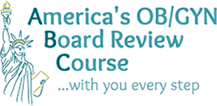Oral Exam - Day of your Exam Strategy
How to Handle the Hot Seat during your Oral Exam
- Know that the examiners write continuously
- Expect an abrupt change to next question
- No feedback
- Remember that each new question is a fresh start, so let the old one go
- Don't get flustered - remember that the examiners expect you to be unable to answer some questions--that's how they explore the limits of your knowledge and your acknowledgment of your limitations
- Admit if you don’t know – Guess only if you are reasonably (80%) sure – If you do not know an answer, state directly that you do not know, but offer how you would find the answer, solve the problem, or the method you would employ – Humility is a sign of competence and confidence
- If you find yourself losing your composure, ask the examiners for a brief break to get a drink of water, you may be reluctant to delay, but it saves time in the long run to get you back on track
- Don’t say you would do something that you don’t do
- Know what your consultants would do
- Ask for clarification if you don’t understand/hear the question
- Answer only the question, then STOP – subsequent questions may be chosen, depending on how you answered a previous question
- Don’t change your answers
- Don’t lecture, teach, or argue
- Don’t quote the “literature”
- Use “I” not “We”
- Accept responsibility
- Know your #s
- Justify breach of standard of care
- Settle “tug of war: what I do vs. what I should do” ahead of time – e.g. Macrosomia: expectant, induction, 10 CD – Support with ACOG evidence-based guidelines
- Avoid social, racial, or religious justification and the following words: "Always" "Never" "Routinely" "Protocol" "Inadvertently" “That’s how I was trained ...”
- Ask for clarification
- Be polite, respectful and make eye contact
- Be aware of posture, body language and minimize hand movements
- Don’t interrupt the examiner, do not answer the question until you have heard the entire question
- Don’t answer by repeating the question
- Don’t be afraid of silence
- Use I would vs. I could
- Admit mistakes – “I learned from this ...” – “Now I do this ...”
- Thank the examiner, end with a smile





